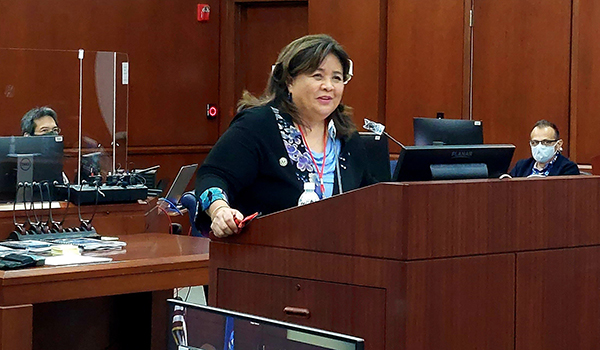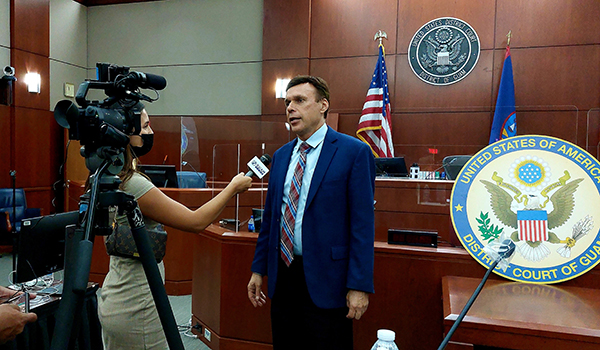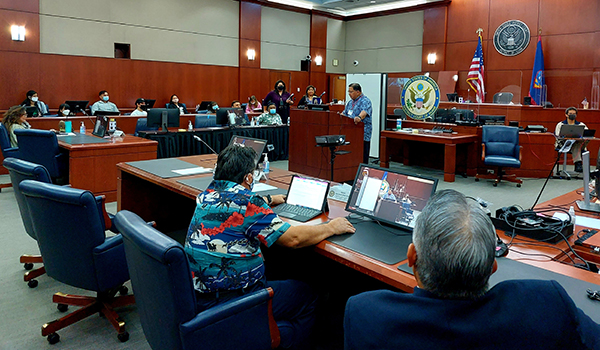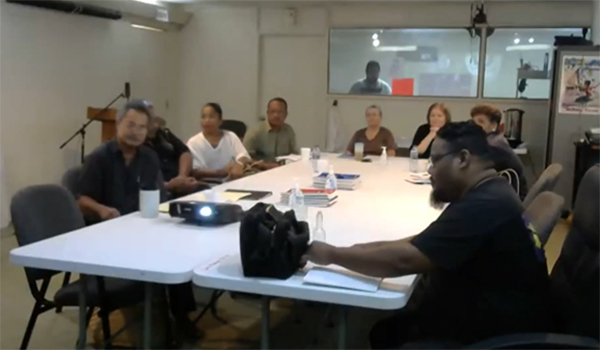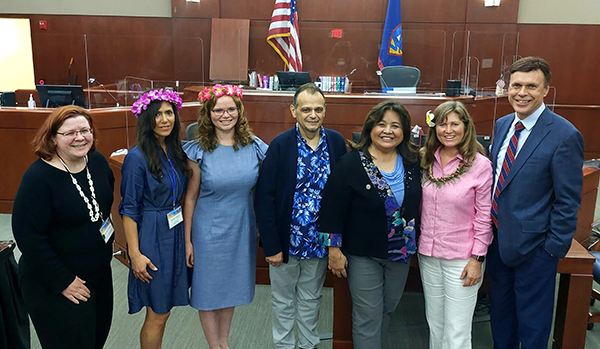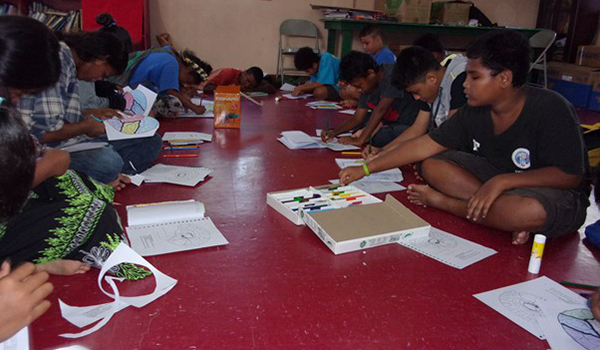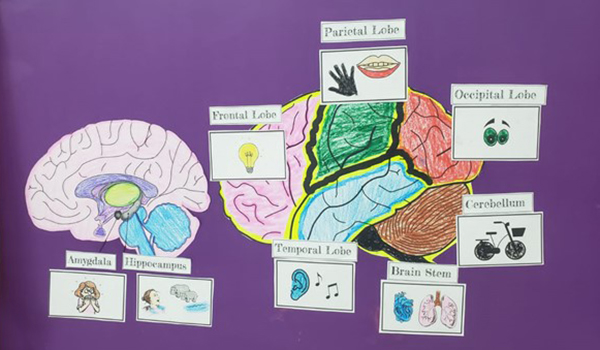
|
Pacific Island Judges Initiate Innovative Pilot Program to Tackle Family ViolenceFebruary 10, 2022
Chief judges and justices in the Pacific islands are in the midst of a historically ground-breaking pilot program that targets family violence in their region. The Pacific Judicial Council’s Family Violence Emotional Quotient (EQ) Program aims to educate their communities on healthy emotional decisions and behavior. Pacific Judicial Council members from Guam, Saipan, Tinian, Rota, Palau, Yap, Chuuk, Kosrae and Pohnpei have teamed up with executive and legislative branch leaders on their islands to ensure success with this very special pilot program. The two-pronged pilot involves a curriculum for public schools as well as a community outreach component. Because the Pacific Judicial Council’s ultimate objective with the program is implementation, the partnership with the two other branches of government is critical. “While our initial and main goal is to reduce family violence in our region, we clearly see the tremendous, immediate, and residual benefits of taking the Emotional Quotient approach,” said the Honorable Frances Tydingco-Gatewood, PJC president and District Court of Guam chief judge. “We are not simply reacting to the violence. We are already categorized in the ‘reactionary’ aspect of violence because we set legal consequences. In this case, we are working to be proactive. The three branches of government are taking very seriously the real possibility that if we can help our people understand their emotions - most especially our children - then they can learn to effectively manage those emotions. They could really learn to successfully control their feelings, words, and actions as youth and then into adulthood. It’s a process, but we’re willing to commit ourselves to this pilot program because our island communities mean that much to us. Now is the time.” A Crisis “Family violence is a topic that is front and center in our mission,” said Judge Tydingco-Gatewood. “Our island children have had a lot of strain placed upon their mental health and emotional well-being, especially during the COVID-19 pandemic crisis times.” Recent studies affirm the rise in family violence. Current comparative statistics on domestic (family) violence in Micronesia and other island areas are scarce, but global data show an upturn in domestic violence incidents. In their 2021 report, “Domestic Violence During the COVID-19 Pandemic: A Systematic Review,” Anastasia Kourti and Androniki Stavridou, the primary authors, drew on 32 studies from North America, Europe, Asia-Pacific Area and Africa. The report’s abstract notes, “COVID-19 has caused an increase in domestic violence cases,” and states that domestic violence reporting is very likely compromised in terms of current statistics, noting “In children, however, although the specialists’ estimations suggested an increase in child maltreatment and abuse cases, the rate of police and social services’ reports has declined during the COVID-19 pandemic. School closures that isolated students at home seemed to have contributed to this decrease. Conclusions: Domestic violence has been a considerable issue imposed by the COVID-19 epidemic to a worldwide context. The home confinement led to constant contact between perpetrators and victims, resulting in increased violence and decreased reports. In order to minimize such issues, prevention measures and supporting programs are necessary.” The report goes on to say, “individual studies reported a decrease in child abuse during the COVID-19 pandemic (Baron et al., 2020; Halford et al., 2020), but Huber (2020) estimated increased child abuse rates. The school was considered to be a protective environment for many children, with educational personnel to be the first ones to complain about abuse (Souza Marques et al., 2020). Thus, those decreased rates may be misleading.” (p. 23) More clearly stated in the Critical Findings section, “The home confinement led to constant contact between perpetrators and victims, resulting in increased violence but also decreased reports. School closures isolated students at home and probably contributed to the decrease of child abuse reports. An increase was observed in helplines calls.” While the process to prepare an EQ pilot for schools and the community had been underway since early 2020, both Judge Tydingco-Gatewood and Justice Manmaw, after learning of U.S. Surgeon General Vivek Murthy’s Advisory: Protecting Youth Mental Health, were highly encouraged and further resolved to ensure the success of the program. Something More Was Needed “We really pondered how we could address the issue and determined that a deeper approach to ending family violence, or violence in general, could be found through a scientifically proven and evidence-based solution referred to as “EQ” (emotional quotient). The prospect of a more peaceful society resulting from our program was too great a chance to pass up, so we presented our proposal to the Executive Board and Education Committee of our Pacific Judicial Council. Justice Manmaw and I were elated that they agreed to approve the funding and launching of the three-phase pilot program. We also consulted closely with U.S. Ninth Circuit Judge M. Margaret McKeown, chair of the Pacific Islands Committee (of the Judicial Council of the Ninth Circuit) and our Ninth Circuit education specialist, Russ Mathieson, (of the Office of the Circuit Executive for the U.S. Courts for the Ninth Circuit) for feedback and guidance.” Ambitious Endeavor Three-phase Program Phase 1 Conference Details Day one, December 1, opened with remarks by Judge Tydingco-Gatewood and Guam Chief Justice the Honorable F. Philip Carbullido, followed by Dr. Nedley who spoke on emotional intelligence and brain plasticity – “changing the brain” and how this evidence-based solution will help to reduce family violence on the islands. Train-the-trainer sessions began that afternoon. Day two started with Dr. Nedley’s presentation: “The Role of the Family in Developing Emotional Intelligence” and “Boosting Your Emotional Intelligence and Helping Others Do the Same.” In these talks, he addressed issues like the differences between a functional and dysfunctional family; the emotional benefits/risks of functional/dysfunctional families and how families can change from dysfunctional to functional families; and how emotional intelligence can be enhanced. Dr. Nedley continued to delve into the issues that lead to dysfunction and what can be done to alleviate those issues, including reducing the use of media and entertainment screen time. Train-the-trainer sessions continued in the afternoon. On the third and final day of the conference, attendees heard details on the EQ pilot program taking place from January to April and from Dr. Nedley on global issues with mental illness. Day three wrapped up with continuing train-the-trainer sessions. Judge Tydingco-Gatewood said she and Justice Manmaw “are elated and encouraged by the enthusiasm shown by all the participants in the EQ curriculum virtual training sessions which have been ongoing weekly since the launch of the pilot program. The participants included not only the teachers of the Micronesian islands, but also principals, administrators, education department directors and community outreach organizers. We are presently immersed in Phase 2.” Other conference attendees who were designated to be members of the different island outreach teams attended the community outreach training sessions which followed the curriculum training sessions. They will be promoting EQ’s life-changing advantages at different venues throughout their islands. Two Major Components Lessons Adapted “Our goal is to bring up the [level of] emotional intelligence of Micronesia and that will help (raise) all of the ships so to speak,” said Dr. Nedley in a recent news article on the conference. “And so, it will help families, it will help our school system, it will help our medical institutions and it’ll help our judicial systems, and it’ll help us make better decisions overall. So, we are hoping that as we enhance the emotional intelligence, we will have better family life.” “I think we have this tendency to think that emotional distress and mental health issues are kind of unsolvable or that we can only alter them a little bit and that’s because we’re too focused on traditional approaches,” Dr. Nedley said in another article. “But if we actually are able to get to the root approaches, which this program is attempting to do, we can see great transformations occur in families and individuals that can be nothing short of amazing,” he concluded. “Our Responsibility as Visionary Leaders” President Joseph R. Biden, Jr., shared the results of the American Rescue Plan with the 90th U.S. Conference of Mayors held Jan. 21, 2022. In his address, he acknowledged the nation’s state of mental health was of critical concern, emphasizing the need to “hire more social workers — folks trained in mental health — so they can partner with trusted community leaders.” Judge Tydingco-Gatewood agreed, noting, “the President’s sentiments are consistent with our EQ pilot program.” Initial Response Overwhelming Associate Justice Kerio D. Walliby, of the Chuuk State Supreme Court, said he has been working for about 14 years with the FSM national government as a program manager/administrator for the FSM Behavioral Health and Wellness Program. “I would like to improve the well-being, the skills and knowledge for the people and children. Understanding and solving the problems through education and counseling will reduce domestic violence and improve emotional intelligence. “During the three-day virtual training, it was great to see many representatives showing their support of the project. Chuuk State has already decided on the three schools to pilot the project, Chuuk High School, Iras Middle School and Mwan Elementary.” Justice Walliby noted there were challenges including commitment to the project, leadership and funding, that had to be met, but that he expects success from the project. “I would like to see this project expanded to other schools to reduce family violence and increase the knowledge and skills of the children in the schools,” he added. Judge Tydingco-Gatewood expressed gratitude for the level of commitment shown by all the government leaders. With regard to TEAM CHUUK specifically, she noted, “their solid attendance, positive attitude and contributions to discussions during the weekly virtual training sessions have demonstrated their dedication to the success of the pilot program.” Working almost exclusively with the state-level courts of these jurisdictions, the committee develops and presents a variety of judicial education and court professional training programs through grants from the U.S. Department of the Interior. Live events were the norm prior to the COVID-19 pandemic, but the committee transitioned quickly to holding online sessions whenever possible. Last summer, Nedley Health staff members developed the lesson content for student and teacher manuals. This effort included identification and designation of curriculum resource materials, lesson plan sequencing, teaching strategies, a detailed description of objectives, evaluation assessments, listing associated activities for in-class and home completion and related community-involved projects. Throughout, the team focused on adapting the lessons for the islands. Pilot schools will introduce program elements along with regular material rather than have separate classes. “Each team is charged with presenting the EQ program curriculum to one elementary school, one middle school, and one high school class, for a maximum of 100 combined participants due to constraints with the materials printing costs,” said Mathieson. If the pilot program is found to be effective at the July assessment, the plan is to institutionalize the program in the curriculum of the island schools, he added. The program is specially designed to educate not just the student learning about emotional intelligence in class, but parents, siblings and others through various elements of the program. Mathieson noted it is hard to estimate how far reach will go, “but in a small island this will get a lot of press and discussion,” he said. “If one were to consider Kosrae (pop. 7,686) or Yap (pop. 11,241) both of which are heavily invested in this effort, I estimate 20-40% of the population to have knowledge or exposure to the program. I estimate this will be a far greater percentage in Chuuk or Guam,” he said. Many thanks to those who helped with this article including Chief Judge Frances Tydingco Gatewood, Chief Justice Cyprian Manmaw and Carmen Kasperbauer. A special thanks to the Ninth Circuit librarians. |
||||


